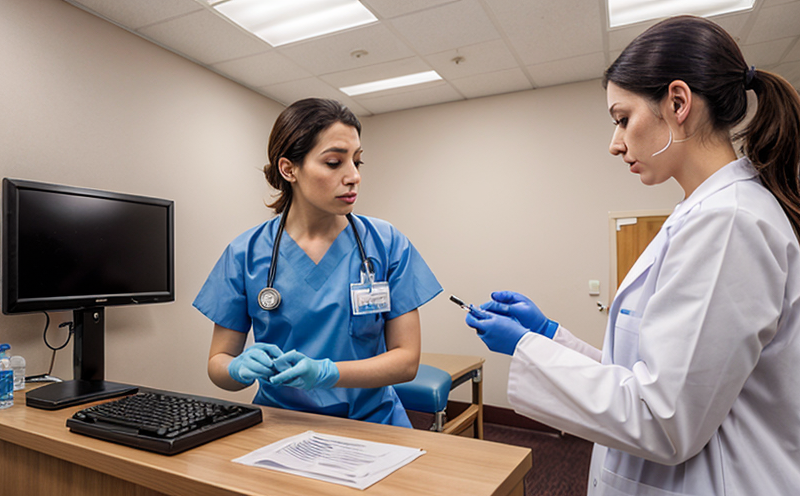Alkaloid Residue Testing in Herbal Veterinary Medicines
The testing of alkaloid residues in herbal veterinary medicines is a critical component of ensuring the safety and efficacy of these products. Alkaloids are a diverse group of nitrogen-containing compounds found naturally in plants, and their presence can significantly impact the therapeutic value and potential risks associated with herbal remedies used for animal health.
Alkaloïdes, as defined by ISO 17254:2016, include alkaloids that have been traditionally used in veterinary medicine due to their pharmacological properties. These compounds are often utilized for treating various ailments in animals, ranging from inflammatory conditions to parasitic infections. However, the presence of high levels or impure forms of these alkaloids can lead to adverse effects on animal health.
The testing process involves several key steps aimed at ensuring compliance with regulatory standards such as those set by the European Pharmacopoeia (EP) and the United States Pharmacopeial Convention (USP). Specimen preparation typically includes extracting the alkaloid content from the herbal medicine using solvents like methanol or ethanol. The extracted solution is then subjected to various analytical techniques, including high-performance liquid chromatography (HPLC), which provides precise quantification of the alkaloids present.
Instrumentation plays a crucial role in this process. Advanced HPLC systems equipped with diode array detectors and UV/Vis spectrophotometers are used for accurate measurement. These instruments allow for detailed analysis, ensuring that even trace amounts of alkaloids are detected and reported accurately. Acceptance criteria for these tests are stringent; they must meet the limits specified by relevant regulatory bodies to ensure product safety.
Quality managers and compliance officers play a vital role in overseeing this process. They ensure that all samples are handled correctly from collection through analysis, maintaining chains of custody and proper documentation. R&D engineers also benefit greatly from alkaloid residue testing as they can refine formulations based on test results, enhancing both efficacy and safety profiles.
Proper procurement practices are essential to source high-quality raw materials for herbal veterinary medicines. By incorporating robust testing protocols like alkaloid residue analysis into their supply chain processes, organizations can minimize risks associated with substandard ingredients.
EuroLab provides unparalleled expertise in the field of clinical toxicology and drug screening for veterinary applications. Our team of certified professionals possesses extensive knowledge about alkaloids and their impact on animal health, enabling us to offer precise and reliable testing services.
With state-of-the-art laboratories equipped with cutting-edge technology such as advanced HPLC systems, EuroLab ensures accurate results every time. This commitment to quality is reflected in our stringent adherence to international standards like ISO 17254:2016, ensuring that all tests meet the highest industry expectations.
Our dedicated staff members are not only well-versed in technical aspects but also understand the broader implications of alkaloid residue testing within veterinary medicine. By leveraging this comprehensive understanding, we provide clients with valuable insights and recommendations based on our findings.
In addition to technical excellence, EuroLab prioritizes customer satisfaction through personalized service tailored to individual needs. From initial consultation through final report delivery, our goal is to ensure smooth collaboration throughout the entire testing process.
Competitive Advantage and Market Impact
EuroLab's leadership in alkaloid residue testing for herbal veterinary medicines sets it apart from competitors by offering unparalleled precision and reliability. This capability allows us to deliver accurate results consistently, which is crucial given the stringent regulatory requirements governing this sector.
Our expertise extends beyond mere compliance; we actively contribute to advancing knowledge within this field. By staying at the forefront of research and development, EuroLab helps shape industry standards and practices. This proactive approach fosters innovation while ensuring that products remain safe and effective.
The market for herbal veterinary medicines is growing steadily due to increasing awareness among pet owners about holistic approaches to animal healthcare. As a leader in this niche area, EuroLab plays an important role by providing robust testing services that enhance consumer confidence and trust. This contributes significantly to our competitive advantage and helps drive positive growth within the industry.
Moreover, EuroLab's commitment to excellence ensures that we remain relevant and responsive to changing trends and regulatory expectations. By continuously updating our methods and staying informed about new developments in alkaloid residue testing, we maintain a strong position in this dynamic market.
Use Cases and Application Examples
The application of alkaloid residue testing is wide-ranging across different scenarios within veterinary medicine. One common use case involves ensuring the quality control of herbal supplements intended for treating inflammatory conditions or parasitic infections in pets. By rigorously examining these products for potential levels of harmful alkaloids, EuroLab helps prevent adverse reactions and promotes safer treatment options.
Another significant example pertains to the development and optimization of new formulations. During research phases, thorough testing ensures that newly developed herbal medicines do not contain excessive or impure forms of alkaloids which could compromise their safety profile. This proactive approach enables manufacturers to create more reliable and effective products.
In addition to these direct applications within product development and quality assurance, EuroLab's expertise also extends into forensic investigations related to suspected adulteration or contamination incidents involving herbal veterinary medicines. Through comprehensive analysis, we can identify the source of any discrepancies and provide definitive evidence regarding compliance status.
Furthermore, regulatory bodies often rely on alkaloid residue testing results when evaluating applications for new products seeking market approval. EuroLab's involvement in such assessments adds credibility to these processes by providing independent verification of product safety and efficacy claims.





